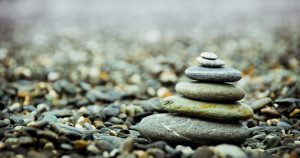by Jenny Rose | Jan 8, 2022 | A Flourishing Woman, The Journey
All my life I’ve felt traumatized by how frequently I’ve moved house. My general insecurity makes uprooting myself a fearful ordeal.
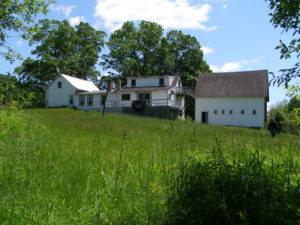
Maine Farmhouse and Barn
This time, as we go through the process of selling this old farm and searching for a new place, I’m realizing for the first time how valuable my experience of moving is. My resentment about it is falling away.
I know most people approach finding a new home from the will-this-place-suit-me direction, and that’s probably practical and sensible. I can and have done that many times, but I also spend a lot of time thinking about whether I will suit the new place, and being curious about how I might fit my life into it rather than forcing it to accommodate me.
I do this because, as I’m realizing now, every place I’ve lived has changed me, challenged me, and shown me new aspects of myself. I’ve never had much money and therefore been unable to have a wide choice or completely renovate, so I’ve learned to adapt and adjust to wherever I am. For the first time in my life, I’m seeing what strength and power lie in that kind of resilience.
I’ve lived in homes, apartments, dorms, a trailer, a log cabin, and my parents’ home (as an adult). I’ve rented and I’ve owned, bought and sold, and been a landlady. I’ve lived with husbands, my kids, assorted animals, and friends. I’ve lived by myself. I’ve lived in large places with ample storage and closets and small places with one closet in the entire house.
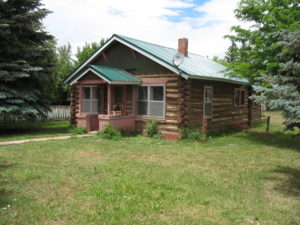
Now, as I approach my 60s, I think I know a lot about what I need, what’s important, and how adaptable I am. Of course, I thought that at 50 when I came to Maine, but this old farmhouse taught me a great deal more. And the new house will teach me yet more. During my time in this house, I also became a minimalist, which has had a huge impact on my priorities and the amount of stuff I manage.
Leaving the place I know, no matter what this house’s challenges, is hard. I am, at least, familiar with the current problems and challenges. But I also know what I love; I’m already grieving the loss of this beautiful 26 acres, the gardens, the wildlife, the views out the windows, the way the sun comes into my little attic aerie, and the shrill spring song of the peepers in the pond.
I realize, however, that the next place I live will present me with new joys. I don’t know what they will be. They won’t be exactly like what I’m leaving. But a new space holds new possibilities and new discoveries, along with fresh challenges.
The thing about limits and challenges is the opportunity they hold. I’m excited by the prospect of creatively solving problems I encounter. One of the good things about having little financial resource is that I’ve been forced to rely on creative, low-cost solutions. If one doesn’t have money to throw at problems, one has to find another way.
Finding another way has always been a journey worth taking for me, a journey into my own power, ability, and creativity. Without the help of abundant money, it can seem like a long, slow, journey, uncomfortable and occasionally even tortuous, but filled with discovery and satisfaction. The new space and I will work together to make something functional and beautiful. We’ll find out about one another. We’ll take care of one another.
We’ll make a new home together.
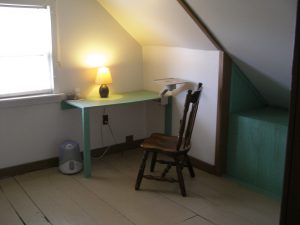
Jenny’s attic is waiting for her. Fall, 2014
by Jenny Rose | Dec 18, 2021 | A Flourishing Woman, The Journey
Last month, Seth Godin wrote about The Lifeguard Hack. Being a lifeguard, it made a lot of sense to me.
This week my team (of lifeguards) and I spent some time in the water training.

Photo by NeONBRAND on Unsplash
Just before Halloween, I pulled the trigger on finding another place to live, right around the same time I decided to serialize my fiction on Substack.
I wasn’t ready to do either of these things, and I’m not ready to have to go in the water and rescue someone at work, either.
Wait! Let me think about this some more. Let me prepare. Let me figure out how to do it perfectly.
Except life doesn’t wait.
Godin is so right. When someone is drowning, I’m going in. It doesn’t matter if I have the proper gear, equipment, attire, or level of energy and alertness. The temperature of the water doesn’t matter. I won’t wonder which form of entry to use. I won’t plan an approach. I probably won’t follow the exact script in our Emergency Action Plan. None of us will. I will blow my whistle, and if I don’t have my whistle, I’ll yell. Loudly. And I’ll go in.
I’ve moved house before. I’ve sold, bought, and figured out how to make it work. I’m not ready, because no one ever is ready, at least not if ready means knowing every detail beforehand. I wouldn’t have planned to decide to do this in late fall with winter and the holidays looming ahead. It just unfolded that way.
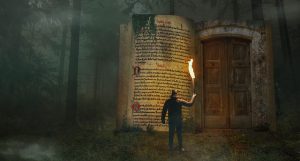
I’ve been thinking for years about ways to get my fiction into the world. Why Substack? Why now? Especially why now when I decide at the same time we need to move?
I don’t know. It’s time. It’s just time.
We re-certify every two years to keep our lifeguard status, and we train frequently. I have experience with moving. I have a disciplined writing practice and am an experienced blogger.
Performing a water rescue, buying a new home and moving into it, publishing on Substack, are all things I can do. I’ve done them, or something similar to them, before. There will be no perfect time. Rehearsing won’t help me. It’s just a way of allowing my anxiety and all the critics in my head to sabotage me.
While we’re hesitating, afraid of failure or less-than-perfect, opportunity slips away. While we’re waiting for the “right time,” we’re losing the time we have now. While we’re rehearsing how to pull a passive victim off the bottom of the deep end, they’re drowning.
For me, the key is not so much courage, which I have plenty of. It’s confidence I struggle with. But a lot of my struggle with confidence is based on old lies and distortions that are not real. I know I can perform a water rescue because I’ve done it before, many times in practice and a couple of times in real life. It wasn’t perfect. It didn’t look like the Red Cross training videos, where everyone is calm, the sun is shining, and it’s all by the book. But nobody drowned. Nobody died.
I hate moving. It opens up a lot of old trauma. But we need to move, and I know I can do it. I know liquor boxes make the best book boxes. I know how to show a house. I know how to navigate the legalities. I know where my power is, and I know what I can’t control in the process. It’s a familiar journey. Waiting for nicer weather, for the market to get better for sellers, better for buyers, or more stable in general; waiting for loans to be easier to obtain, or interest rates to go down, or to win the lottery; waiting for the stars to align just right because I’m scared, is not effective. The time is now. We’ll figure it out. Whether we have two years or a month of the process ahead of us, it’s begun and it will play out the way it plays out. It will be stressful, and exhausting, and a chaos of boxes (and cats) and belongings, tape and markers, and things we can’t find. It won’t be perfectly thought out or executed.
On Substack, people will read or they won’t. People will like the fiction, or they won’t. They’ll tell their friends and share it, they’ll comment, they’ll help me build a healthy, interactive community engaged in discussing community, story, and how to live more effectively on our planet, or they won’t. I didn’t start out perfectly. I go back every couple of days and tweak things. I’m figuring it out as I go.
We figure life out as we go. Our friends help us. We learn. We adjust. We make mistakes. We do our best.
So, yeah. If you go down in one of our pools while I’m on the stand, I’m coming in after you, and the rest of my team will be right behind me. I’m not ready. But I’m coming in.

Photo by Chris Kristiansen on Unsplash
by Jenny Rose | Dec 11, 2021 | A Flourishing Woman, The Journey
I subscribe to Seth Godin, who provides me with a few sentences of daily food for thought in my Inbox. This week, I read this link about the difference between accuracy and precision.
Godin’s distinction between the two is one I never thought about before, but I have been thinking about roots.
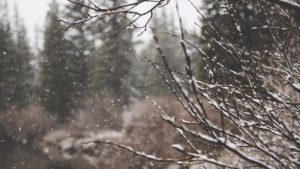
Photo by Arun Kuchibhotla on Unsplash
Deep roots. Strong roots.
Roots grow toward sustenance. They don’t grow toward, or in, barren soil. Cell by cell, rootlet by rootlet, inch by inch, they spread, seeking water, seeking the soil and mineral resource they need. Cell by cell, stem by stem, twig by twig, inch by inch, trees and plants grow aboveground in search of sunlight.
Trees and plants want to live. They seek the resources necessary to do so. Survival is their simple, accurate agenda. A seed germinates and grows toward successful reproduction, wherever it happens to be.
Exactly how the roots and crown need to grow, exactly where the best sustenance and water will be found, exactly what the quality and quantity of sunlight will be, all these precise determinations have no meaning unless the imperative to survive exists, and can’t be planned ahead. It all depends on context.
The accuracy comes first. Then the precise details.
I’m thinking about this because we are relocating, not from Maine, but from this old farmhouse.
A year ago, I wrote a series of posts about holistic management, and I’ve been reviewing my holistic plan regularly ever since. My intention, my accurate intention, in Godin’s language, is to create a simpler, more sustainable life.
The precise details? Well, that’s a hairball of monstrous proportions that’s currently keeping me up nights.
Maybe it doesn’t need to. I started with an accurate intention and have taken all kinds of steps toward that, not only with my physical living situation, but also with my writing and life in general. The precise details of each of those steps were not visible to me a year ago when I created my plan and started acting. I moved forward, and identified and dealt with specifics as I came to them.
When I was younger, I had an easier time with big changes, because there was always time to adjust, to go back, to change my mind, to make another choice in the future. But now, as my partner and I age, it feels more urgent to get it exactly right and position myself perfectly for any eventuality.
This is silly, of course. The things we agonize over usually never happen, and if they do, they don’t happen in the way we predicted. The challenges we do encounter are often complete surprises we could never have foreseen or imagined.
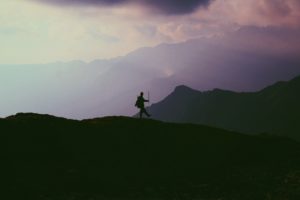
Photo by yatharth roy vibhakar on Unsplash
Godin’s thought for the day reminded me, again, that life is a journey. It’s a process. It unfolds. Much as I’d like to know exactly where and when, who and how, those precise details are hidden in the future. It’s not time to know them yet. Right now, today, I need to live those questions and steer with my intention: a simpler, more sustainable life.
That’s the tree I planted last year. Now it’s beginning to grow. The roots are seeking nourishment. The plant aboveground is seeking sunlight. When I look back over the last twelve months, I can see how much growth there’s been, but as I lived the last year I didn’t think about growth or progress. I dealt with specifics arising out of my accurate, intentional seed and put one foot in front of the other.
Now we approach the still, dark, heart of winter, and as I take stock, look over my shoulder and raise my gaze to the horizon ahead, I realize afresh movement in the right direction is what counts. The specifics reveal themselves in their own time. Whatever my feelings of anxiety, fear, and overwhelm, I’m also flowing in the current of my accurate intention.
I’m forced to admit I have a choice. I can rest in faith in myself, in my intentions, and in life generally. I can cultivate my curiosity and sense of exploration, discovery, and fun.
Or I can make myself miserable trying to figure out every single detail yesterday and pushing this important transition to go as fast as possible so I don’t have to feel my feelings and wrestle with my panic-stricken thoughts any more.
It’s really not a choice I want to make. I don’t feel I have the energy to fight my compulsion to speed like a maniac through my life right now, obsessing about money, cleaning, and showings, collecting and packing boxes, and checking online every 10 minutes for new MLS listings. In Central Maine. In December. In our modest price range.
But even as I think that thought, I know it’s a lie. Whatever will be, will be. There’s only so much power I have in this picture. What’s really at stake is whether I enjoy the ride as much as I can or exhaust myself, risking illness and injury, just when I most need to be healthy and whole. One way or another, we are leaving this place and necessarily going somewhere else. Part of me wants to throw up my hands and spin out of control, but the wiser, saner part of me sees the choices clearly and knows which ones to make.
Sigh.

Maine Farmhouse and Barn
by Jenny Rose | Nov 7, 2021 | A Flourishing Woman, The Journey
A frequent conversation among my coworkers at our rehab pool facility, as well as our mostly middle-aged and older patrons and patients, has to do with the unexpected places life takes us. How did we get here from there?

Photo by yatharth roy vibhakar on Unsplash
For some this is a bittersweet question, for others an amusing one, and for others a bewildered or even despairing one. Whatever our current reality is, none of us could have foreseen or imagined it when we were young adults.
We can all talk about dreams we’ve had, intentions, hopes, and choices we’ve made in pursuit of the life we imagined we wanted, but life itself is always a wild card. It picks us up by the scruff of our neck, sweeps us away, and casts us onto strange shores.
As I age and practice minimalism, I realize keeping my dreams flexible has never been more important. My dreams, along with everything else, change. What I longed for as a young woman is not what I want now. What I needed in midlife is not what I want as I approach my 60s. Some things I’ve thought of as merely desirable are now essential, and other things I thought I needed no longer seem important.
In some ways I like dancing with change, my own as well as external circumstances. It feels dynamic and healthy. Resilience and adaptation are strong life skills.
In other ways it’s hard, the way my needs and I change. Often, I feel my own natural change and growth are hurtful to others. I try to hold them back. I try to stop myself, make myself quiet and small so no one will be upset, including me!
In the end, though, there’s something in me that’s wild, and sure, and deeply rooted in the rightness of change. It can’t be silenced or stifled, and there’s no peace for me until I begin living true to myself once again, no matter the cost.
The costs are very high. The personal costs of living authentically have been catastrophic for me. Sometimes I feel I’ve paid with everything I ever valued.
And yet the power of living authentically, the peace of it, the satisfaction of shaping a life that really works and makes me happy … How much is too much to sacrifice for that?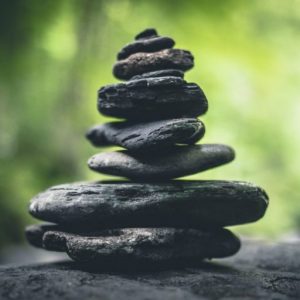
For a long time, I’ve thought about balance. Financial balance. Work-life balance, which is a term so nonspecific as to be useless. Balancing time. Balancing socialization and solitude. Balancing sitting and writing with physical activity. The complex balance of give and take in relationships. Balancing needs and power.
Minimalism is about balance. Achieving a simple life demands balance, something hard to find in an overcrowded life. Practicing simplicity and working toward balance take mindfulness, which is a difficult skill to hone in our loud, distracting, manipulative and addictive consumer culture. There’s a lot of social pressure to want more and bigger, to hang on tightly to our things.
But I want less. I want less stuff, less expense, less noise (visual and otherwise), less maintenance, less complication. I want less because I want more. I want more peace, more beauty, more sustainability, more time for loved ones and the activities that are most important to me. Gardening. Animals. Walking. Writing. Playing. Spiritual practice.
I don’t want more than I need. I don’t need more than I can use, enjoy, take care of, or pay for.
I do want to accommodate change, my own, and changing circumstances around me. The simpler and easier my life is, the more space I have to welcome my own aging and wherever my life journey takes me next. I don’t make myself crazy trying to anticipate all the future possibilities, but I want to know I can live well with the resource I have and build reserves for whatever the future brings.
Ironically, it often takes resource to go from more to less. Financial resource. Time and energy resource. It takes sacrifice, in the sense of being willing to give up things valued for the sake of things even more valuable and worthy. In its own way, moving in the direction of living simply is as much work and emotional cost as the endless treadmill of more. It does have an end point, though, whereas more is never satisfied.
Last week I read a post from Joel Tefft titled ‘Abandon, Embrace‘. He suggests daily journaling (which I also highly recommend) using the writing prompts: Today I abandon ___ and today I embrace ___. This is balance in action. What is not helping? What is most important? Abandon something in order to make space for something better.
We can’t find a place for what’s most important if our cup is already too full.
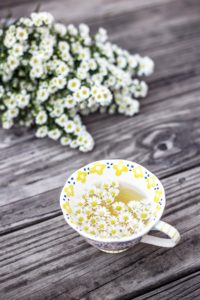
Photo by ORNELLA BINNI on Unsplash
Deciding what kind of a life we want to live and working to create it is a difficult process of choice. It’s difficult because it can be so hard to tell the truth about our needs and feelings. Sometimes we have to give up on cherished dreams and hopes, come to terms with our current limitations. Our choices can affect others in hurtful ways. Sacrifice is not easy. Managing our feelings is not easy.
Choosing, as I’ve said before, involves consequences we can’t always control.
But to make choices, especially difficult ones, is to be standing in our power, as is creating an authentic life that allows us to grow deep roots and be the best and happiest we can be, for ourselves, for our loved ones, and for the world.
by Jenny Rose | Oct 21, 2021 | A Flourishing Woman, The Journey
On Monday my new site, harvestingstones.com, went live. I had my first post ready and I gleefully published it, anticipating my subscribers landing on the new site this week. I checked with a subscriber to make sure the post notification email went through and linked properly to Harvesting Stones.

Photo by freddie marriage on Unsplash
No email.
Uh-oh.
Then my partner started exploring the menus and submenus, which I had checked in great detail well before the site went live, and they weren’t working properly, either.
Then I saw I had no subscribers. The subscriber list hadn’t transferred over from Our Daily Crime.
Shit!
I took a deep breath, told myself not to panic, and started figuring out what went wrong with the help of my web designer.
I discovered that somewhere in the transition some of my work on the new site had been lost, and that’s why the menus weren’t linking properly. I finished redoing that work yesterday. In the meantime, my web designer, who is far more tech savvy than I am, began troubleshooting the subscriber list issue.
When I went to bed last night, I still had no subscribers.
When I got up this morning, I had subscribers again, along with an email from WordPress tech support saying the problem was fixed.
It seems too good to be true.
As none of my subscribers were notified when my Monday post explaining why Our Daily Crime has become Harvesting Stones was published, I’m posting again. For more about the why behind this transition, read my previous post. Also, please note I’m going to begin posting on the weekends rather than midweek now.
Transition and change are hard, have you noticed? Messy and stressful and scary.
My hope is that, if you’re reading this post and you’re a subscriber, you were notified as usual via email that I published it and any links involved work as intended. If not, I’ll figure out what needs to be done and do it, and we’ll have a take 3!
Please bear with me.
Also, remind me not to move to a new domain again in future! I’m very glad I did it, but I don’t want to do it again.
None of this would have been possible without Kathy Allen at Greenlight Websites.
I’ll leave you with advice from an old tree:
Grow deep roots and welcome the wind in your branches.
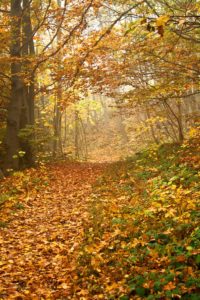
Photo by Vanessa von Wieding on Unsplash
by Jenny Rose | Oct 18, 2021 | A Flourishing Woman, The Journey
It’s time. Harvesting Stones is now live, after six months of hard work. I hope you enjoy the new site as much as I do!

Why harvesting stones? We can’t plant pebbles and grow big stones. Why would we want to?
Stones are hard and heavy. Aside from gemstones or the pebble in our shoe, we don’t think about them much. Stone, after all, is everywhere. Healthy soil is the child of stone, plants and animals. Stone is literally the foundation of our world. It’s the raw material we live on, build and decorate with. Stone shapes the land. We break our backs and tools on stone.
We also, especially as children, marvel at the colors and shapes of stones. We pick them up, finger them, carry them in our pockets, take them home and set them on a shelf or table.
Stone is elemental. It contains a record of the planet’s history, and our history as a species. It contains the future, for every stone eventually wears away. It’s what remains when all else has perished, like bone, like seed. Stone endures.
Stone is resilient. It weathers. Water shapes it. Plants split it. Lichen breaks it down. Volcanic heat melts it. It can be chiseled and carved, and then time blunts and wears away the chiseling and carving. Given enough exposure and time, stone becomes sand and soil. It’s never lost. It’s always becoming.
Stone is uncompromising in its simplicity. It will bruise us, scrape our skin off, cling stubbornly to the field where it’s not wanted, make us ache with its weight. It doesn’t pretend to be something it’s not. It’s authentic.
Harvesting Stones is about presence. It’s about appreciating the stones we trip over, the stones we carry in our hearts and bellies and pockets. It’s about coming to terms with discomfort and looking past our narrow focus on monetary value and popular beauty. It’s about power.
I lately came across an exercise in The Enchanted Life by Sharon Blackie. She asks the reader: If you could be any place in the landscape, what would you be?
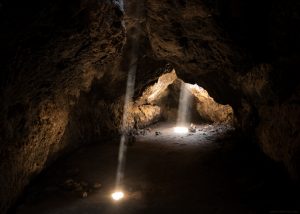
By Joshua Sortino on Unplash
I would be a cave. A hidden place, a haven. A cozy cave from which I could hear and see and taste the outside world. I’d be a cave with a spring falling into a stone basin, a cave with ledges and shelves, a cave with, perhaps, a bat colony in some part of it, or a hibernating bear, or a new animal mother and her young. A womb of stone.
Not surprisingly, caves show up everywhere in my reading and writing.
Creating Our Daily Crime was an extraordinary experience. I could never have imagined how many stones I would turn over, how much I would grow and learn, what I would discover, what I would let go. I was unprepared for how powerful it would be. Powerfully healing. Powerfully connecting.
Now I want to do more with that power. I wanted something more creative, more authentic, and more accessible for readers, browsers, and searchers. I wanted to create a digital space to share more poetry, more resources, more stories, and my books.
Welcome to Harvesting Stones.
